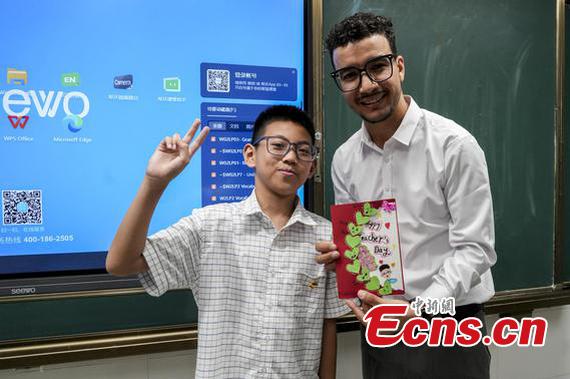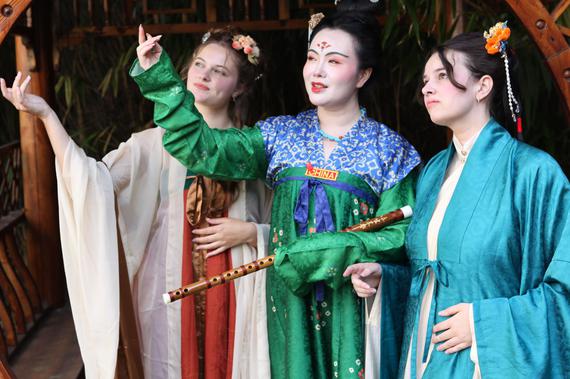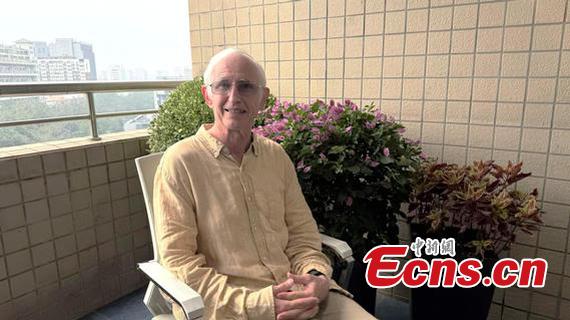[Opinion]Robert Walker: Why is cross-cultural understanding the 'glue' that holds the world together?
(CNS) --“Cross-cultural understanding is the glue needed to hold the world together,” stated Robert Walker, Emeritus Professor of Green Templeton College, University of Oxford.
Seven years ago, Walker was invited to serve as a professor at Beijing Normal University and has been residing long-term in China. During his time there, he has collaborated with colleagues on research concerning poverty and social policy. In a recent exclusive interview with China News Service's W.E. Talk column, he reflected on the vital role that cross-cultural understanding plays in bridging differences and enhancing communication.
Here are excerpts of the interview:
CNS: What motivated your decision to reside long-term in China, and what personal experiences of cross-cultural understanding have you encountered since your arrival?
Robert Walker: I first came to China in 2006 to attend a conference at the Chinese Academy of Social Sciences. The discussions proved interesting, revealing both considerable differences and similarities between China and my own culture, sparking my academic interest in China.
Over the following decade or so, I engaged in several international research projects that included China as a subject of study. By setting China in global context, and through collaboration with Chinese colleagues involved in the research, I gradually developed a more nuanced understanding of China.
After retiring as professor from the University of Oxford in 2018, I was invited to teach in China and have resided here since then. I lead a unique life in China. To this day, I still cannot speak Mandarin, so my everyday experiences rely largely on the support of my colleagues, friends, and students. Their generosity, compassion, and willingness to help a “strange foreigner” have left a deep impression. These individuals and moments have become a profoundly important part of my life. It seems to me that generosity is a characteristic of everybody I have met in China.
There is a respect for education and the teaching profession. We have a Teacher's Day every year, which wouldn't necessarily take place in my home culture. There is also a concept of respect for elders, which is not so much recognised in the West. Take, for instance, the custom of holding the door for others. On several occasions, I have had polite disagreements with women over opening the door. They insist that I go first because I am older, while I hold the door for them because they are women. These differences have become part of my life here.

A student from Zhenghong Primary School in Henan Province presents handmade Teacher's Day greeting cards to a foreign teacher on September 10, 2025. (Photo by Fan Xiaoheng, China News Service)
I suppose my understanding remains that of an outsider. Therefore, it is these differences that provoke questions in me, and my questions, in turn, cause my Chinese colleagues to wonder, “Why would he think that way?” It is through this kind of interaction that we have begun to unpack the complexities of Chinese society.
CNS: Why is cross-cultural understanding necessary, and what inspired your initial focus on this issue?
Robert Walker: Cross-cultural understanding is fundamental, both at the individual level and between nations.
We look at the world through the structures that we were brought up with, and these don't necessarily match across cultures. This creates distortion. We have to move beyond the notion that “my culture is right.” This attitude lies at the heart of respect. Through respect comes understanding, and through understanding comes respect. This initiates a continuous process.
Perhaps influenced by religious traditions, the Western culture I come from often insists on a binary view of the world—right versus wrong. That is an incredibly challenging way of looking at the world. China's approach is different. It speaks of “a shared future,” “a common destiny,” and “working together.” It advocates recognising, accepting, and seeking harmony amid differences. This constitutes a profoundly different worldview.
Currently, there are many misunderstandings about China in the West. That is a direct consequence of a lack of understanding. If the world doesn't talk to each other, we create myths and even greater misunderstandings than we already have.
I focus on cross-cultural understanding because I have become part of this process myself. Since taking up long-term residence in China, I have been personally engaged in cross-cultural understanding, which has led me to challenge my presumption or assumptions about how the world works. I am no longer confident that I was “right”, and instead I have begun to appreciate different ways of attaining the same goal and therefore to incorporate those perspectives.
I arrived in China with a set of ideas that I had acquired from being exposed to Western media through newspapers, television, and social media. What I found was that China was profoundly different from what I had expected it to be. This is why I want to counteract those misunderstandings. I see part of my role as telling honest stories about China based on my experience, in the hope of prompting others to reflect on their assumptions and encouraging them to question in a spirit of seeking understanding. Thus, we can grow and mature as a global society.

September 21, 2025 (local time): The Mid-Autumn Festival Garden Party was held in The Hague, Netherlands. Pictured is a member of the Dutch Hanfu Society (center) posing for a photo with Dutch visitors dressed in Hanfu. (Photo: China News Service / De Yongjian)
CNS: What do you consider to be the main challenges to achieving cross-cultural understanding today?
Robert Walker: The primary obstacle is a lack of knowledge about others' cultures. While we are not able to know the cultures of all countries, we can still try to understand by asking, listening, and empathising when engaging with people from different cultures. Governments also have a responsibility to cultivate experts and citizens who can use humanistic skills to understand how another country works.
Language also presents a challenge. The way that we use language shapes how we think, and the differences between Chinese and English are particularly pronounced. In Chinese, characters and words must be approached holistically, based on relationships between phenomena, ideas and people in the context in which they occur. Whereas in English, context is often less emphasised. We have to think about how the content of the messages that we wish to convey would be understood in the other language, and seek to present them in ways our audience would.
In addition, the prevailing global mindset of “viewing the world through a competitive lens” is another major impediment. The West often sees the world as “us” and “the others”, and calls the latter adversaries. That just prevents solutions, fosters isolation, and destroys cultural understanding. When we isolate those who are different out of ignorance, we begin constructing narratives based on imagination, creating divisions through a “good versus evil” dichotomy.

Foreign tourists play Chinese shuttlecock at the Bell Tower, located along Beijing's central axis, July 26, 2025. (Photo: China News Service / Zhao Wenyu)
Therefore, we desperately need cross-cultural understanding to bridge these differences, enabling humanity to work together as one on the shared project of making life better for everyone.
CNS: You have published numerous articles describing the China you have seen and experienced. What encourages you to persist in doing so?
Robert Walker: What I have written stems entirely from my lived experiences in China. As a researcher, I have always been interested in learning about the world. What I am writing is as truthful as I can make it. Living here has made me aware of a China profoundly different from the one I initially came to know through reading. I wish to share this discovery in the hope that others who arrive in China will not have as distorted a perspective as I did.
I see it as my responsibility to tell the story of my life in China. Each article I write makes me think in a different way. I have to consider how my story will be understood by my readers. Thus, I mentally step outside of China to look at it from an external perspective, while also telling stories from the inside.
I am now preparing to compile my writings into a book, tentatively titled China in the World, and I find it a pleasure to be doing this work.

Robert Walker (Photo by Chi Hanyu)
Robert Walker is an Emeritus Fellow of Green Templeton College, University of Oxford, and has devoted his academic career to poverty research. He is also a Fellow of the Royal Society of Arts and the British Academy of Social Sciences, and was awarded an MBE in 2012 for his services to social policy research. Since 2018, he has served as a professor at Beijing Normal University and is a member of its Jingshi Academy.
https://www.ecns.cn/news/cns-wire/2025-09-22/detail-ihevnqwe9217616.shtml


